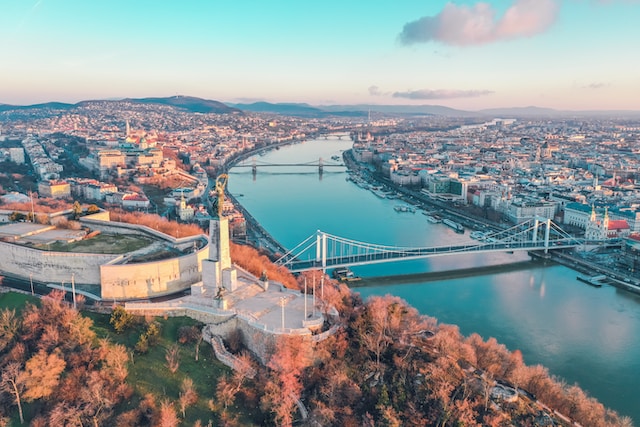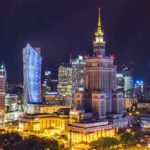Living in Budapest as a Digital Nomad
Welcome to Budapest, the stunning cultural gem of Central Europe and a top destination for digital nomads worldwide. With its affordable cost of living, reliable internet connections, rich history, and vibrant atmosphere, it’s no wonder remote workers are flocking to this beautiful city.
In this Digital Nomad Guide to Budapest, I’ll explore everything you need to know — from the best places to live and work, networking opportunities to visa requirements — ensuring your time in Hungary’s capital is productive and unforgettable.
Key Takeaways
- Budapest is a top destination for digital nomads due to its affordable cost of living, reliable internet connections, rich history and vibrant atmosphere.
- District VII (Jewish Quarter) and District V (Downtown) are the best areas to stay in Budapest for remote workers. Both boast easy access to public transportation, coworking spaces and cultural landmarks.
- Digital nomads can find accommodation in Budapest through online rental platforms like Flatio or popular sites such as Airbnb or Booking.com. Short-term apartment rentals offer flexibility and comfort while allowing you to experience different neighbourhoods before finding your perfect home away from home.
My Experiences
As the sun cast its warm golden rays over the stunning architecture of Budapest, I couldn’t help but feel a sense of excitement and freedom. This was my first time in the Hungarian capital, and I was about to embark on a thrilling adventure as a digital nomad. With my laptop in tow and a world of possibilities ahead of me, Budapest promised to be the perfect city to embrace the nomadic lifestyle.
Finding a co-working space in the heart of the city was my top priority. After some research, I stumbled upon a vibrant and innovative co-working space nestled in the bustling District V. As I stepped through the doors, I was immediately greeted by a vibrant atmosphere and the buzz of fellow digital nomads immersed in their work.
The co-working space catered to my every need, providing a productive environment with comfortable workstations and ergonomic chairs. The high-speed internet connection ensured I could seamlessly connect with clients and collaborate with colleagues across the globe. The space also offered private meeting rooms for those important video conferences and brainstorming sessions.
But what truly set this co-working space apart was the sense of community it fostered. Over the next few weeks, I forged meaningful connections with fellow digital nomads from all walks of life. We would often gather in the communal areas, sharing stories, ideas, and even collaborating on exciting projects. The co-working space organized networking events, skill-sharing workshops, and cultural outings, which not only enriched my professional growth but also allowed me to experience the vibrant pulse of Budapest.
Outside of work, Budapest beckoned me to explore its wonders. I would often find myself strolling along the banks of the Danube River, marveling at the breathtaking views of the Hungarian Parliament Building illuminated against the night sky. The city’s rich history and architectural grandeur provided the perfect backdrop for my digital nomad lifestyle.
During weekends, I would venture beyond the city limits, discovering hidden gems like the picturesque towns of Szentendre and Eger, immersing myself in their unique cultures and indulging in the local cuisine. The thermal baths of Budapest became my sanctuary, offering a much-needed respite from the demands of work and a chance to rejuvenate both body and mind.
Living as a digital nomad in Budapest allowed me to embrace a true work-life balance. I could work on my own terms, exploring the city’s vibrant cafes and parks during the day and diving into my projects during the quieter evenings. The city’s affordable cost of living meant I could savor local delicacies without breaking the bank, treating myself to Hungarian goulash and chimney cakes while still saving for my next adventure.
As my time in Budapest drew to a close, I couldn’t help but reflect on the incredible experiences and personal growth I had gained during my stay. Budapest had become my temporary home, a city that embraced digital nomads and offered them a platform to thrive.
Leaving Budapest behind was bittersweet, but the memories and connections I made would stay with me forever. With my laptop securely tucked away, I boarded the train, ready to continue my journey as a digital nomad, carrying the spirit of Budapest and the digital nomad community with me, knowing that wherever I go, I can create my own path, find new co-working spaces, and build a life of freedom and adventure.
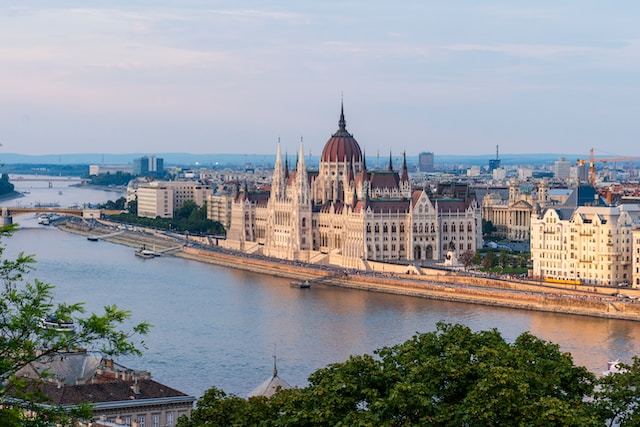
Budapest, Hungary
Why Budapest Is A Top Destination For Digital Nomads
Budapest is a popular destination for digital nomads due to its affordable cost of living, reliable internet connection, cultural richness, and stunning architecture.
Affordable Cost Of Living
One of the most appealing aspects of Budapest for digital nomads and remote workers is its affordable cost of living. In comparison to other popular European cities, such as Paris or London, Budapest offers a lower cost without sacrificing quality or comfort.
Furthermore, daily expenses like public transportation and eating out won’t break the bank either. A monthly transit pass will set you back around $35, and sampling Hungary’s delicious local cuisine at restaurants can be enjoyed for as little as $6 per meal.
Reliable Internet Connection
Budapest boasts a reliable and high-speed internet connection, ranking 12th in the world according to Speedtest’s Global Broadband Speed Survey conducted in December.
This is essential for digital nomads and remote workers who depend on stable connections to manage their work effectively.
Furthermore, acquiring a local SIM card upon arrival allows digital nomads to benefit from extensive mobile data coverage throughout Budapest. With several providers offering affordable data plans with high speeds up to 50 Mbps or more, it’s easy to stay connected during your time exploring Hungary’s capital.
Cultural Richness
Budapest’s vibrant cultural richness is a major draw for digital nomads and remote workers seeking an inspiring backdrop for their globe-trotting office. With its history that stretches back over 1,000 years and roots steeped in Roman, Ottoman and Habsburg influences, Budapest is a melting pot of architectural styles ranging from Gothic to Baroque and Art Nouveau.
Art lovers can savour the city’s myriad galleries, museums, and festivals while music enthusiasts will delight in Budapest’s thriving underground music scene, showcasing anything from jazz to techno.
Film buffs might recall that several Hollywood blockbusters were filmed on location here due to the cinematic grandeur of Buda Castle or Fisherman’s Bastion. And who could forget Hungary’s rich tradition of folk dance and handicrafts? Dive into this unique tapestry by attending local workshops or browsing through markets like Szimpla Kert Farmer’s Market.
Beautiful Architecture
Budapest is a city that offers stunning architecture, making it an ideal destination for digital nomads who appreciate history and culture. The distinct blend of baroque, neoclassical, and art nouveau buildings creates a unique atmosphere that sets Budapest apart from other European cities.
From the ornate Hungarian Parliament Building to the Fisherman’s Bastion on the Buda side of the city, there are many impressive structures to explore.
The captivating architecture also provides plenty of inspiration for remote workers looking for creative spaces to work in or take breaks during their day.
The rich history behind each building only adds to their appeal. Every architectural wonder tells its own story dating back centuries, providing insight into Hungary’s past as well as modern-day life in Budapest.
Climate/weather In Budapest
udapest experiences a continental climate with four distinct seasons – spring, summer, autumn and winter. Summers in Budapest are warm with temperatures ranging from 20 to 25 degrees Celsius and low humidity levels, making it an ideal time for digital nomads to explore the city’s historical sites and cultural events.
Autumns are mild but can be rainy at times.
Overall, when planning a trip to Budapest as a digital nomad or remote worker it’s important to keep in mind that there are four distinct seasons each offering its own unique charm and challenges depending on what you’re looking for.
Cost of living in Budapest
The cost of living in Budapest is relatively low compared to other European cities. A single person estimated monthly costs are 761.6$ (261,416.5Ft) without rent. Budapest is 48.3% less expensive than New York (without rent). Rent in Budapest is, on average, 83.8% lower than in New York.
Here is a breakdown of the average cost of living in Budapest:
- Rent: A one-bedroom apartment in the city center costs around 400-600 USD per month. A studio apartment in the city center costs around 300-400 USD per month.
- Utilities: Utilities (electricity, water, gas, and internet) cost around 50-100 USD per month for a single person.
- Food: Eating out in Budapest is very affordable. You can get a meal at a local restaurant for around 10-15 USD. Groceries are also relatively cheap.
- Transportation: Public transportation in Budapest is very affordable. A monthly pass costs around 25 USD. You can also get around by walking or biking, which is free.
- Entertainment: There are many free and low-cost things to do in Budapest, such as visiting museums, walking around the city, and going to parks. If you want to go to a bar or club, expect to pay around 5-10 USD for a drink.
Overall, the cost of living in Budapest is very affordable. You can live comfortably on a budget of around 1,000 USD per month.
Best Areas To Stay For Digital Nomads In Budapest
District VII, also known as the Jewish Quarter, is a popular area for digital nomads due to its vibrant nightlife and ample coworking spaces. District V, or Downtown Budapest, is another great option with easy access to the Danube River and several historic landmarks.
District VII (Jewish Quarter)
District VII, also known as the Jewish Quarter or the Party District, is an excellent area for digital nomads staying in Budapest. This neighbourhood has a rich history and culture, which adds to its unique charm.
In addition to being culturally rich, District VII is considered safe for tourists and digital nomads alike. It’s easily accessible through public transportation, making it convenient to navigate around the city.
Additionally, this area is home to many coworking spaces and coffee shops that cater specifically to remote workers seeking a place to work productively while enjoying Budapest’s vibrant energy.
District V (Downtown)
District V, located on the Pest side of the Danube River, is one of the top areas for digital nomads and remote workers to stay in Budapest. It boasts a fantastic location, right in the heart of the city’s cultural and commercial activities, with several tourist attractions such as St.
Stephen’s Basilica and Hungarian Parliament Building nearby. This area offers an excellent variety of coworking spaces and cafes for remote workers looking for places to work or network.
Additionally, District V is well-connected and easy to explore on foot or by public transportation, providing easy access to other parts of Budapest.
District VIII (Palace District)
The Palace District, also known as District VIII, is one of the best areas for digital nomads and expats in Budapest. This district has undergone a revitalization in recent years and is now home to various international universities.
The Palace District boasts a rich architectural heritage with ornate Baroque-style buildings lining the streets which have been converted into co-working spaces, cafes and boutique stores.
Digital nomads will love exploring this area on foot thanks to its accessibility to other districts via public transport systems such as tram lines 4-6 which run from Rákóczi Square right through the heart of the city, allowing easy access to any destination that you would like to visit or work from.
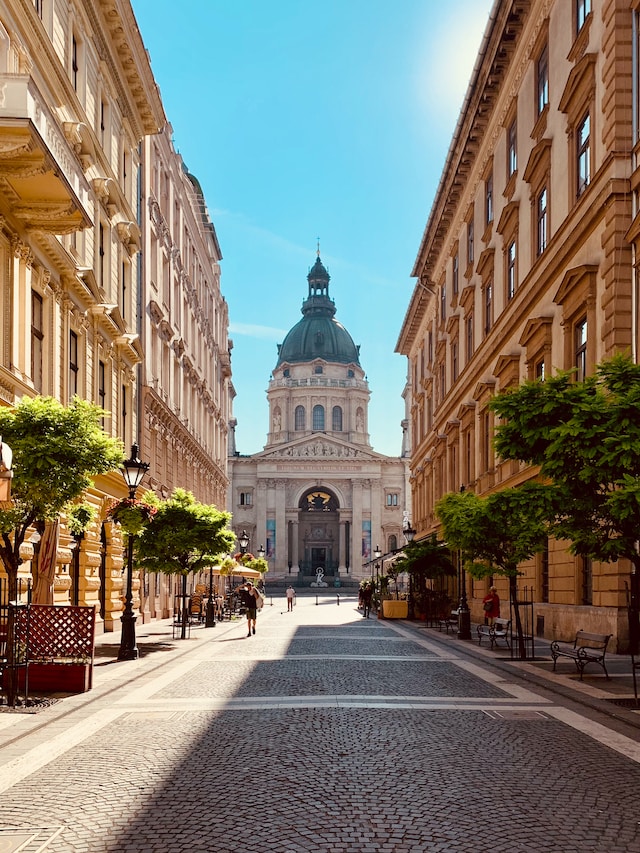
City Center, street in Budapest, Hungary.
Finding Accommodation In Budapest
Digital nomads can find accommodation in Budapest through online rental platforms, short-term apartments, or hostels.
Online Rental Platforms
Finding accommodation as a digital nomad in Budapest can be challenging, but online rental platforms like Flatio offer convenience and flexibility.
With Flatio, you can find hand-picked apartments that are tailored to the needs of remote workers in Budapest.
Other popular online rental platforms for finding accommodation in Budapest include Airbnb and Booking.com.
Using these rental platforms not only makes it easier for digital nomads to find suitable accommodation quickly, but it also helps them save money when compared with traditional hotel bookings.
Short-Term Apartments
Short-term apartments are a popular choice for digital nomads in Budapest, as they offer the flexibility and comfort of a home away from home. Many digital nomads prefer to book these apartments on online rental platforms like Airbnb and Flatio.
The beauty of short-term apartments is that they come fully furnished with all basic necessities like towels, linens, toiletries and cooking appliances. Plus, you get to experience living in different neighbourhoods around Budapest before finding your perfect long-term accommodation option.
Budapest has a well-established culture of long-term apartment rentals with many landlords looking for tenants who want to stay in their properties for several months or even years.
Hostels
If budget-friendly accommodation is what you’re after, hostels in Budapest are the perfect fit for digital nomads. In fact, Budapest has been known to be a backpacker’s paradise, with many hostel options available across different districts of the city.
Impact Hub Budapest and Nest Coworking are some of the more popular hostels that attract digital nomads from all over the world. Not only do they offer affordable rates, but they also provide excellent networking opportunities and coworking spaces within their premises.
Best Co-working Spaces In Budapest
Impact Hub Budapest, KAPTÁR Budapest, and Loffice Budapest are the top coworking spaces in Budapest for digital nomads seeking a professional work environment with all necessary amenities.
Impact Hub Budapest
Impact Hub Budapest is a popular coworking space and community center that caters to the needs of digital nomads and remote workers. Located at the well-connected Ferenciek tere metro station in Budapest, Impact Hub has offices all around the world, making it a globally connected community for digital nomads.
It is considered one of the top coworking spaces in Budapest for its central location and opportunities to join fellow digital nomads.
The space offers several amenities such as 24/7 access to fully-equipped facilities ideal for individual or team workspaces. Events are held regularly which helps connect people from various communities.
Digital Nomads can also gain memberships which enables them with additional perks such as discounts on services from their partners including travel agencies or even legal counselling services.
KAPTÁR Budapest
KAPTÁR Budapest is one of the top coworking spaces for digital nomads, freelancers, startuppers and entrepreneurs in Budapest. It has gained recognition as the fifth-best coworking space on earth and continues to provide a unique experience to people looking for inspiration and community in their workspaces.
As part of the Digital Nomad Guide to Budapest, KAPTÁR Coworking offers its members an inspiring environment where they can work collaboratively or independently.
Its amenities include a community office and event space that foster collaborations between members from different fields.
Loffice Budapest
Loffice Budapest is a top coworking space in the city, providing excellent facilities for digital nomads. The space features modern equipment, high-speed internet connection, meeting rooms and private offices and is located on Andrássy Avenue in District VI – one of Budapest’s most prestigious areas.
This co-working space has been designed with a focus on sustainability and community building. In addition to its workspaces, Loffice also hosts various events such as workshops and networking opportunities that help remote workers stay connected and inspired.
Best Coffee Shops For Working Remotely
Madal Cafe, Espresso Embassy, and Fekete Cafe are some of the best coffee shops in Budapest for digital nomads to work remotely.
Madal Cafe
If you are a remote worker looking for a reliable and comfortable coffee shop to work in Budapest, Madal Cafe is the place to be. With three branches scattered across Budapest, this cafe is practically designed for digital nomads and has become a hotspot for remote workers.
Madal Cafe not only offers good coffee, but also a variety of food options including bread, pastries, sandwiches and smoothies that can keep you fueled throughout your workday.
Recently expanded to a bigger space, Madal Cafe provides ample seating arrangements both indoors and outdoors with large windows allowing natural light in during day-time operations.
Espresso Embassy
If you’re looking for the perfect coffee shop to work from, look no further than Espresso Embassy. Located in Budapest’s District V (Downtown), Espresso Embassy is a popular destination for digital nomads and remote workers alike.
What sets Espresso Embassy apart from other coffee shops is its commitment to quality beans sourced from around the world. They offer specialty coffees prepared in alternative ways that are sure to delight any coffee connoisseur.
Fekete Cafe
Located in the trendy District V of Budapest, Fekete Cafe is a paradise for digital nomads looking for great coffee and reliable internet. The cafe provides free Wi-Fi and has comfortable seating options both indoors and outdoors.
Rated as one of the best restaurants for remote workers in Budapest, this hidden gem is located at a central location with fast connectivity options. Its laid-back atmosphere makes it an ideal place to work remotely or socialize with other digital nomads while enjoying some delicious food.
Things to do in Budapest
Digital nomads in Budapest can enjoy working remotely in some of the city’s beautiful outdoor spaces such as Margaret Island, City Park and Gellért Hill while enjoying the stunning architecture and natural beauty that Budapest has to offer.
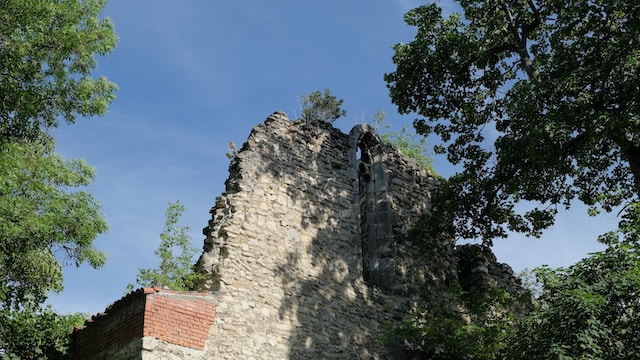
Budapest, Margaret Island, Hungary
Margaret Island
Margaret Island is an oasis of calm within the bustling city of Budapest. Nestled between Buda and Pest, it offers a mix of recreational areas such as green lawns, medieval ruins, and peaceful gardens.
The island has become a popular destination for digital nomads and expats in Budapest who are looking for a laid-back lifestyle while working remotely.
One unique feature that makes Margaret Island stand out from other locations is its thermal baths. Known as the “Spa island of Budapest”, visitors have access to thermal pools, water slides and even wave machines! Margaret Island is easily accessible on foot or by bike, making it an ideal place for those who want to explore beyond their laptop screen.
City Park
Located in the heart of Budapest, City Park offers a peaceful and inspiring environment for digital nomads to work. Its beautiful green spaces, calming lake, and picturesque architecture make it a perfect outdoor workspace for those who crave nature’s touch while working remotely.
City Park is just one example of how Budapest caters to the needs of digital nomads. With around 30 different types of coworking spaces scattered throughout the city and plenty of recreational spaces like this one, Budapest is quickly becoming an enticing destination for remote workers seeking inspiration outside their home offices.
Gellért Hill
Gellért Hill is a must-visit destination for digital nomads in Budapest. With its stunning panoramic views, forested parkland, and paved footpaths, this location offers plenty of opportunities to work outdoors while enjoying the beautiful nature Budapest has to offer.
Many visitors choose Gellért Hill as their base because of its peaceful environment that provides an escape from crowded places and helps increase productivity.
Digital nomads should plan a visit to the Gellért Hill Citadel to learn about the history of the area.
Networking Opportunities For Digital Nomads In Budapest
Digital nomads in Budapest can expand their network by joining the Budapest Digital Nomads Facebook Group, attending the Budapest Entrepreneurs Meetup, and participating in Startup Safari Budapest.
Budapest Digital Nomads Facebook Group
The Budapest Digital Nomads Facebook Group is a private group with over 5,000 members, making it an excellent resource for networking opportunities and staying connected to the community.
As a digital nomad in Budapest, joining this group can provide you with access to valuable information about upcoming events and meetups tailored specifically for remote workers.
Additionally, through the Facebook group, it’s possible to find accommodation options that are ideal for digital nomads. By utilising online platforms such as these groups or Meetup groups when coming to Hungary and looking to work remotely is essential in meeting like-minded individuals who share your interests and need help navigating local resources.
Budapest Entrepreneurs Meetup
The Budapest Entrepreneurs Meetup is a networking group that brings together entrepreneurs, freelancers, and digital nomads in Budapest.
This group offers an excellent opportunity for individuals to meet like-minded professionals, exchange ideas, and build valuable connections. Members of the group organise monthly events where participants can share their experiences and learn from each other.
In addition to the regular meetings organised by the Budapest Entrepreneurs Meetup team, there are also various events throughout the year catering specifically to remote workers or digital nomads looking to expand their networks in Budapest.
Startup Safari Budapest
If you’re a digital nomad looking to network with like-minded individuals in Budapest, look no further than Startup Safari. This annual event offers an opportunity to connect with local entrepreneurs and fellow remote workers, as well as gain insight into the city’s startup scene.
Since the launch of Hungary’s digital nomad visa program, Budapest has become an increasingly attractive destination for remote workers. With its affordable cost of living and vibrant cultural scene, it’s no wonder that so many are flocking to the city.
Visa Requirements For Digital Nomads
Digital nomads who plan to stay in Budapest for longer than 90 days will need to apply for a Schengen Visa or a Hungarian Residency Permit, with the latter being specifically designed for digital nomads.
Schengen Visa
It’s important for digital nomads and remote workers to be aware of the Schengen Visa when traveling in Europe. The Schengen Area is made up of 26 European countries that have abolished passport and other types of border control at their mutual borders.
However, it’s crucial to note that non-EU residents are required to obtain a Schengen Visa if they plan on staying in the area for more than 90 days within a 180-day period.
While this might seem like a hindrance, there are options for visa-free travel available depending on your nationality. It’s always best to check with your country’s embassy or consulate before making any travel plans within the Schengen Zone as procedures can vary from country-to-country.
Hungarian Residency Permit
Digital nomads looking to work and live in Hungary can now apply for the Digital Nomad Visa (DNV), also known as the White Card. This is a temporary residence permit issued by the Hungarian government that allows qualified individuals, including digital nomads, to legally work and live in Hungary for at least 183 days.
Those who obtain this visa will be considered tax residents of Hungary. The application process can take up to 30 days and applicants will need to provide certain documents along with paying a fee.
Staying Safe And Healthy In Budapest
When it comes to staying safe and healthy in Budapest, there are a few things digital nomads should keep in mind such as being aware of pickpocketing and taking caution when out at night; yet, with its affordable health care system and abundance of fresh food options, Budapest is also an excellent place for remote workers looking to stay healthy while abroad.
Avoiding Pickpocketing
Pickpocketing is a common issue faced by travelers in Budapest, and digital nomads are no exception. It’s essential to keep your belongings safe when exploring the city, especially in crowded places such as tourist attractions, public transport, and restaurants.
Staying aware of your surroundings can also help prevent becoming a victim of pickpocketing. Be cautious if someone bumps into you or tries to distract you while another person reaches for your belongings.
Keeping an eye on your belongings at all times is crucial, even when sitting at coffee shops or coworking spaces.
Staying Safe At Night
As with any city, it’s important to take precautions when walking around at night in Budapest. Stick to well-lit areas and avoid secluded alleyways or parks.
If you’re travelling alone, try to find a buddy system with other digital nomads or expats staying in your accommodation.
Budapest is generally considered safe for tourists and digital nomads alike, but like any major city, there are some areas that should be avoided after dark. District VIII (Józsefváros) has a reputation for attracting less desirable elements of society, so exercise caution if you find yourself in this part of town after sunset.
Eating Healthy And Affordable Food
Staying healthy and eating well is an important aspect of life, especially for digital nomads who may spend long hours working on their laptops. Budapest has plenty of options to eat healthy and affordable food while enjoying the city’s vibrant culinary scene.
From vegan-friendly restaurants like Napfényes Étterem to traditional Hungarian dishes like goulash at Kispiac Bisztró, there is something for everyone.
Another great option is street vendors selling Langos -a deep-fried dough topped with sour cream and cheese – or kürtőskalács- a sweet pastry coated in sugar -. These can be found all over the city and are not only delicious but also very budget-friendly.
Overall, eating healthily while staying under budget is entirely possible in Budapest – so you should indulge yourself!
Conclusion
In conclusion, Budapest is a top destination for digital nomads due to its affordable cost of living, reliable internet connection, cultural richness and stunning architecture.
As a digital nomad in Budapest, there are several areas such as District VII (Jewish Quarter), District V (Downtown), and District VIII (Palace District) that offer great accommodation options.
In addition to apartments and hostels, there are also plenty of coworking spaces such as Impact Hub Budapest and Loffice Budapest where remote workers can collaborate and network with like-minded individuals.
From the outdoor workspaces at Margaret Island or Gellért Hill to the coffee shops at Madal Cafe or Espresso Embassy – there’s something for everyone in this picturesque city.
FAQs:
1. What are the best areas for digital nomads to work in Budapest?
Budapest offers a range of coworking spaces and cafes with reliable wifi, such as Impact Hub Budapest or Fekete Cafe. The District VII area is particularly popular with digital nomads due to its central location and vibrant atmosphere.
2. Are there any visa requirements for digital nomads visiting Budapest?
Digital nomads from EU countries can stay in Hungary without needing a visa, while those from outside the EU may need to apply for a Schengen visa. It’s always best to check current visa regulations before booking travel plans.
3. What are some cultural experiences not to be missed while in Budapest as a digital nomad?
Besides exploring the stunning architecture and soaking in one of the city’s famous thermal baths, it’s highly recommended that you try Hungarian cuisine at local restaurants like Kéhli Vendéglő and visit historical sites like Fisherman’s Bastion or St Stephen’s Basilica.
4. How affordable is living in Budapest as a digital nomad compared to other European destinations?
Budapest is known for being an affordable destination making it ideal for budget-minded travellers looking to live comfortably on less.. Costs vary but generally speaking prices can be up to 50% lower than cities like London, Amsterdam, Paris etc – especially when it comes down cost-of-living essentials (like rent/food) which make up majority expenses incurred during extended stays abroad.. Budapset has plenty options when it comes down finding cheap accommodations depending upon location preferences & desired amenities; whether staying long-term or short-term housing needs shouldn’t put too much strain on wallet given vast array different property options available via platforms like AirBnB/hotels/hostels around town!
More FAQ’s
1. What is Budapest known for?
Budapest is the capital city of Hungary and is known for its thermal baths, rich history, stunning architecture, the Danube River, and the Parliament Building. It is also famous for its ruin bars and nightlife.
2. What are the best places to visit in Budapest?
Some of the best places to visit in Budapest include Fisherman’s Bastion, thermal baths, the Jewish Quarter, Buda Castle, and the Danube Promenade.
3. What is the cost of living like in Budapest?
The cost of living in Budapest is relatively low compared to other European cities. The average price of a meal in a restaurant is around HUF 3,500, a one-way public transportation ticket costs HUF 350, and the average monthly rent for a one-bedroom apartment in the city center is HUF 150,000.
4. How is the public transportation in Budapest?
5. Is Budapest a good place for digital nomads?
Budapest is a great place for digital nomads and remote workers. It has a growing community of co-working spaces, hostels, and cafés that offer high-speed internet access. The city is also affordable, has a rich culture, and is centrally located in Central Europe.
6. What is the visa process for living in Budapest?
If you are planning to stay in Budapest for more than 90 days, you will need to apply for a long-term visa. Non-EU citizens may also need to apply for a residence permit. The requirements and application process may vary, so it’s best to check with the Hungarian embassy or consulate in your country.
7. What is the best time to visit Budapest?
The best time to visit Budapest is during the shoulder season, which is from March to May and September to November. The weather is mild, and there are fewer crowds. The summer months can get very hot, and the winter months can be very cold. However, visiting during winter also brings Christmas markets and festive vibes.
